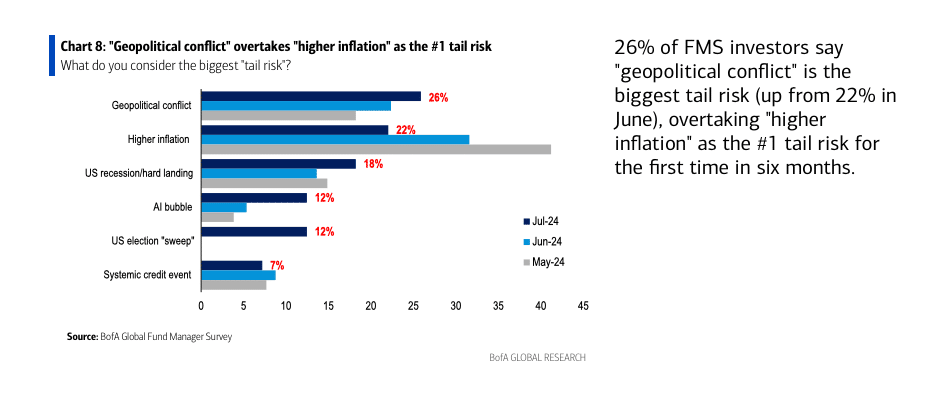–Geopolitics Number One ‘Tail Risk’
–U.S. Yields, Dollar Higher On ‘Clean Sweep’ Expected for Republicans in November
By Vicki Schmelzer
NEW YORK (MaceNews) – World investors were bullish in July, with sentiment fueled by Federal Reserve rate cuts expected this year and into 2025, according to BofA Global Research’s monthly fund manager survey, released Wednesday.
At the same time, however, rising geopolitical angst, especially in the U.S., put a damper on global growth expectations.
In July, 87% of those polled expected that the Fed will lower interest rates in the second half of 2024, with 56% looking for the first Fed cut at the Sept. 18 FOMC meeting. In June, 84% eyed cuts in the second half and 39% looked for cuts in September.
On the growth front, 27% of portfolio managers looked for weaker economic growth in the coming year. This compared to 6% in June and 9% in May and was in sharp contrast to April, where a net 11% of managers looked for stronger world growth.
Inflation projections further stabilized in July, with a net 62% of investors looking for lower CPI in the next 12 months, vs. a net 57% in July and a net 56% in May.
In terms of asset allocation, global investors pared back riskier assets and moved monies to more stable instruments.
In July, a net 33% of portfolio managers were overweight global equities, compared to a net 39% overweight in June and a net 41% overweight in May.
A net 9% of managers were underweight bonds this month, versus a net 17% underweight in June and a net 6% underweight in May.
This month, commodity holdings fell to a net 1% underweight. This compared to a net 6% overweight in June and a net 13% overweight in May.
Allocation to real estate slipped to a net 29% underweight, “the lowest allocation since Jan’09” and compared to a net 23% underweight in June and a net 28% underweight in May.
Average cash balances rose to 4.1% in July, compared to 4.0% in June and 4.2% in April. Allocation to cash stood at a net 1% underweight in July, versus a net 6% underweight in June and a net 3% overweight in May.
On regional asset allocation, this month the U.S., emerging markets, Japan and the UK saw inflows at the expense of the eurozone.
Allocation to U.S. equities rose to a net 16% overweight in July. This compared to a net 7% overweight in June and a net 12% overweight in May.
This month, a net 10% of managers were overweight eurozone stocks, down from a net 30% overweight in June and compared to a net 18% overweight in May.
Allocation to global emerging markets (GEM) rose to a net 9% overweight in July from a net 1% overweight in June. This compared to a net 4% overweight in May.
This month, allocation to Japanese equities rose to a net 7% overweight from a net 4% overweight in June, while UK allocation increased to a net 4% underweight from a net 12% underweight in June.
In July, the biggest “tail risks” feared by portfolio managers were: “Geopolitical conflict” (26%), “Higher inflation” (22%), “US Recession/Hard Landing” (18%), “AI bubble” (12%), “US election ‘sweep’” (12%), and “Systemic credit event” (7%).
In June, the biggest “tail risks” feared by portfolio managers were: “Higher inflation” (32% of those polled), “Geopolitics” (22%), “US Election” (16%), “Economic hard landing” (14%), “Systemic credit event” (9%) and “AI bubble” (5%).
With U.S. election concerns moving more quickly onto the radar screen, fund managers were asked which policy areas would be most impacted by the November election.
Of those polled this month, “trade policy is viewed as the most likely area to be impacted by the US election per 48% of FMC investors, followed by immigration (15%), and geopolitics,” BofA Global Research said.
“Only 9% expect taxation and 2% expect energy policy to be impacted,” the survey said.
In terms of election reaction, 77% of fund managers looked for 10-year U.S Treasury yields to rise and 52% expect a higher U.S. dollar in the event of a “clean sweep” by one political party in November.
In addition, 48% of those polled viewed an election “sweep” as largely positive for U.S. equities.
In July, the “most overcrowded” trades were deemed: “Long Magnificent Seven” (71% of those polled), “Short Japanese yen” (12%), “Short China equities” (5%), “Short small cap stocks” (5%), and “Long Gold” (4%).
In June, the “most overcrowded” trades were: “Long Magnificent Seven” (69% of those polled), “Short China equities” (8%), “Long Gold” (8%), “Long US dollar” (5%), “Long bitcoin” (3%) and “Long European equities” (1%).
Note: the term “Magnificent Seven” was coined by Bank of America’s chief investment strategist Michael Hartnett, referring to a basket of the seven major tech stocks: Apple, Microsoft, Amazon, NVIDIA, Alphabet, Tesla and Meta.
An overall total of 242 panelists, with $632 billion in assets under management, participated in the BofA Global Research fund manager survey, taken July 5 to July 11, 2024. “209 participants with $560bn AUM responded to the Global FMS questions and 134 participants with $262bn AUM responded to the Regional FMS questions,” BofA Global said.
Contact this reporter: vicki@macenews.com

